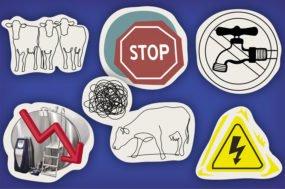Dairy Farmers of Canada (DFC) is a proud sponsor of Nutrition Month 2022.
This year’s theme explores ingredients for a healthier tomorrow, with a focus on sustainability. This important topic is relevant and timely for everyone in the food system, from growers and producers to consumers. We can all help reduce the environmental footprint of our diet by reducing food waste, buying Canadian products when possible and choosing less processed foods.
As primary food producers, dairy farmers are committed to managing resources responsibly for future generations. Farmers do this through our proAction program, which includes sustainable practices to preserve air, land and water resources, as well as enhance biodiversity. What’s more, because sustainable eating must always consider human health, that means nutritious milk, cheese and yogurt go hand-in-hand with sustainable healthy eating goals.
DFC’s dietitians are excited to help Canadians explore ingredients for a healthier tomorrow by providing tips, ideas and strategies to support sustainable food and health journeys. Visit What you eat to learn more.
4 tips for a healthier you and a healthier planet
Looking for ways to reduce the environmental footprint of your diet? Here are a few concrete ideas to try.
1. Reduce food waste. Plan your meals and snacks and shop only for the foods you need, use wilted vegetables in soups and sauces, store your food properly and freeze any extras. Save your leftovers for a future meal instead of throwing them away. When eating out, bring leftovers home. Avoiding food waste is one of the most important things we can do to reduce the environmental impact of our diets.
2. Eat to satisfy hunger and support health. Eat the right amount of food to meet your needs – no more and no less. By only consuming what we need (with occasional indulgences, of course), we use fewer agricultural resources, such as land, water and livestock, and ensure a better food supply globally.
3. Buy local products. Favour local foods grown and produced in Canada. Don’t hesitate to ask farmers questions about the practices they use to protect the environment. Not only will you help the planet, but you will also get fresher, more flavourful foods as a result of supporting the local economy.
4. Choose a healthy and balanced diet. A sustainable diet must, above all, meet your nutritional needs. Eat fewer nutrient-poor highly processed foods (such as sugary drinks and chips), as they contribute to your environmental footprint without providing nutritional benefits. Look instead for nutritious whole foods, such as fruit, vegetables, whole grains, legumes, milk, yogurt and cheese, as well as fresh meats, poultry and fish. Opt for a healthy variety of nutritious protein foods and fill half your plate with fruit and vegetables. Reducing the environmental impact of your diet starts with a balanced approach.
Did you know?
Greenhouse gas (GHG) emissions associated with Canadian milk production represent just 1% of all GHGs in Canada. The adoption of new technologies, optimal cow feeding strategies and major investments in research and innovation have helped substantially reduce the environmental impact of Canadian milk production. From 1990 to 2016, the carbon footprint of a litre of Canadian milk decreased by 23% – and dairy farmers aren’t stopping there. Find out more about dairy farmers’ sustainability practices by visiting Dairy Farmers of Canada.
From our dietitians to you, Happy Nutrition Month 2022. ![]()
Dairy Farmers of Canada (DFC) is the national policy, lobbying and promotional organization representing Canadian dairy producers. DFC strives to create stable conditions for the dairy sector in our country. It also seeks to maintain policies that promote the sustainability of Canadian dairy production and promote dairy products and their health benefits. Visit dairyfarmers.ca for more information.








